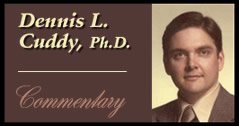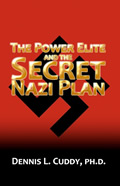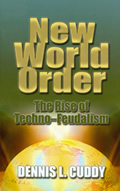LINCOLN
PART 1
By
Dennis L. Cuddy, Ph.D.
February 4, 2013
NewsWithViews.com
[Note: On January 23, 2013, Secretary of State Hillary Clinton testified before the Senate Foreign Relations Committee regarding the Benghazi, Libya terrorist raid on the American Consulate there that killed four Americans, including Ambassador Christopher Stevens. When Senator Ron Johnson questioned her about the Obama administration's initial claim that the attack had sprung from a protest regarding a video, Secretary Clinton replied, "...was it because of a protest, or was it because of guys out for a walk one night who decided they'd go kill some Americans. What difference at this point, does it make? Our job is to figure out what happened and do everything we can to prevent it from ever happening again, Senator." This response by Secretary Clinton is amazing and dangerous for at least two reasons. First, regarding "what difference it makes," if we were to prematurely and incorrectly blame China or Russia, for example, for an incident that cost American lives, we could find ourselves in World War III. Secondly, concerning the "It is our job to figure out what happened" remark, she is making this comment about two months after the attack. If she hasn't "figured out what happened" in two months, that is like sending a green light to terrorists all over the world to attack us as soon as possible because we are too stupid to figure out what happened for at least two months! And does she really still believe that attack could have been by "guys out for a walk one night"?
In support of the claims I made in my book, COVER-UP: GOVERNMENT SPIN OR TRUTH?, I am quoting here from David Swanson's April 30, 2012 review of Sibel Edmonds' book, CLASSIFIED WOMAN: "One afternoon in October 2001, Edmonds was asked to translate verbatim an audio file from July 2001 that had only been translated in summary form. She discovered that it contained a discussion of skyscraper construction, and in a section from September 12th a celebration of a successful mission. There was also discussion of possible future attacks. Edmonds was eager to inform the agents involved, but her supervisor Mike Feghali immediately put a halt to the project. Two other translators, Behrooz Sarshar and Amin (no last name given), told Edmonds this was typical.
They told her about an Iranian informant, a former head of SAVAK, the Iranian "Intelligence" agency, who had been hired by the FBI in the early 1990s. He had warned these two interpreters in person in April 2001 of Osama bin Laden planning attacks on United States cities with airplanes, and had warned that some of the plotters were already in this country. Sarshar and Amin had submitted a report marked VERY URGENT to Special Agent in Charge Thomas Frields, to apparent no effect. In the end of June they'd again met with the same informant and interpreted for FBI agents meeting with him. He'd emphatically warned that the attack would come within the next two months and urged them to tell the White House and the CIA. But the FBI agents, when pressed on this, told their interpreters that Frields was obliged to report everything, so the White House and other agencies no doubt already knew...."]
Actor Daniel Day-Lewis does a commendable job in the new film "Lincoln," in which he portrays the 16th president of the United States. The Steven Spielberg movie is based on Doris Kearns Goodwin's 2005 book, TEAM OF RIVALS, which focuses upon Lincoln's Cabinet members. Unlike President John F. Kennedy's top administrators being his allies, characterized in David Halberstam's THE BEST AND THE BRIGHTEST, Lincoln considered his political rivals as "the best and the brightest" and appointed them to Cabinet posts.
Lincoln could also be said to have followed the old adage, "Keep your friends close and your enemies closer," in making his Cabinet appointments. On issue after issue that Lincoln discussed/debated with his Cabinet "rivals," he often won them over to his position. There were, however, those with whom he would have deep and lasting disagreements. Such was the case with Secretary of War Edwin Stanton, who believed Lincoln would be too lenient on the Confederates during Reconstruction after the Civil War.
Lincoln is primarily known for being the president during the Civil War and for freeing the slaves. The true story, though, is more complcated than most realize. Most people think the Civil War was fought over the existence of slavery in the United States, but it was not. In fact, it was fought over the issue of secession from the Union, and Lincoln once wrote a letter to a man saying that if he could preserve the Union without freeing a single slave, that is what he would do! After the Civil War commenced, it took Lincoln two years to issue the Emancipation Proclamation in 1863. And even then, the Emancipation Proclamation did not free all of the slaves, but only those in the Confederate states that were conquered/occupied by Union forces.
| Subscribe to the NewsWithViews Daily News Alerts! |
The real instigators of the Civil War were the Power Elite (PE), led by the British. In THE PRESENT ATTEMPT TO DISSOLVE THE AMERICAN UNION: A BRITISH ARISTOCRATIC PLOT (1862), one can see a March 13, 1809 letter from British Emissary John Henry in Boston referring to the desirability of separating the states within the United States, and saying that "cannot be effected but by a series of acts and a long-continued policy tending to irritate the Southern and conciliate the Northern people....It would forever secure the integrity of his Majesty's possessions on this continent." The abolition of slavery would be one of those issues that would "irritate" the South. And in a March 15, 1861 letter from U.S. Minister to Vienna John Lothrop Motley to his own mother, Motley described a plot to divide the United States into North and South, with the Confederate states joining with Mexico, Central America, Cuba and other islands "to establish a great Gulf (of Mexico) Empire."
� 2013 Dennis Cuddy - All Rights Reserved










 Share
This Article
Share
This Article






